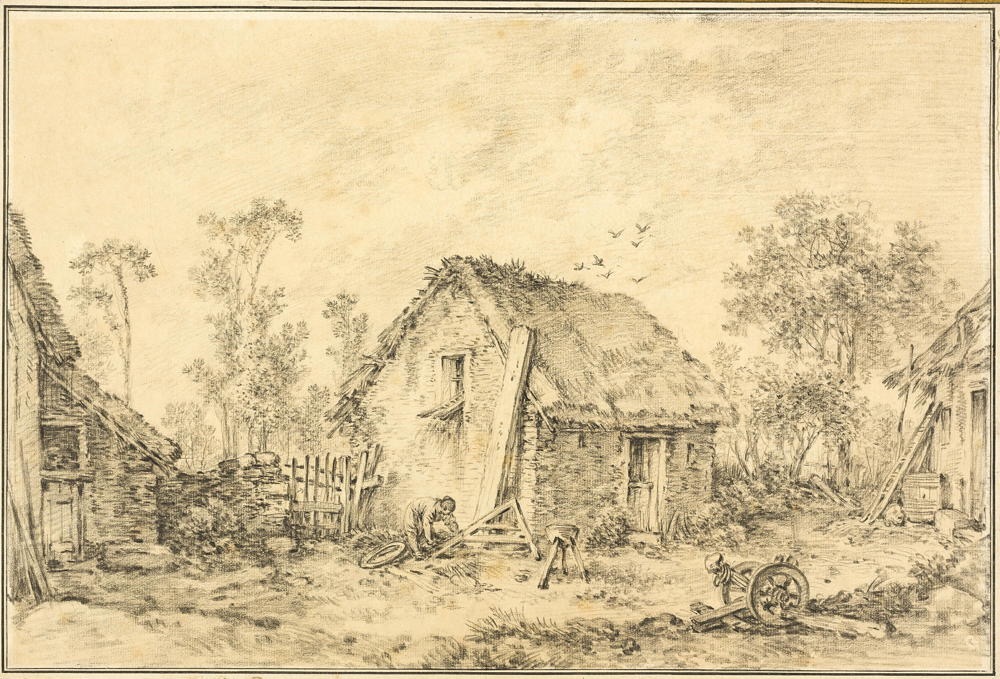ReInspecting

François Boucher:
Landscape with Rustic Cottage (c. 1760)
" … an essence of ProjectCommunity."
Failing that first inspection threw our porch remodeling project into some chaos. We started insisting upon dotting 'i's and crossing 't's, which affected momentum. Our concrete contractors found another project to entertain them while waiting for the city to mark where utility lines lay. A couple of days later, we decided that since they would be digging with shovels rather than backhoes, we would be unlikely to get into trouble if we just went ahead and started digging around the offending footings. You might remember that the inspector found the footings too shallow and that the engineer had prescribed simply digging deeper beneath the four load-bearing points along the footing. The crew quickly dug the prescribed depth and dimensions on three of the four load-bearing points. I ordered a second inspection before they'd finished the fourth point, which looked to be a more difficult dig. The inspector appeared at the appointed hour, though the contractors didn't.
It was clear that the work was not yet complete. Three out of four holes were dug, but no rebar was placed. The inspector suggested that the fourth hole might be better just sawed out since that end of the footing was particularly shallow. The inspector also noted that the excavation was not precisely to specification, but the spec could not be satisfied given existing conditions. We were not free to just dig anywhere, given that we were excavating around supports holding up the porch roof above. I was able to cross-examine the examiner since it would be his judgment that would pass judgment upon the acceptability of our efforts.
Given that we cannot dig to exactly specified dimensions, would it be acceptable if the mass of our correction exceeds the specified mass? He considered the question and offered a less-than-wholehearted acceptance, but still a "yes!" Could we place the rebar on a diagonal to ease the effort of placing it? That, too, would prove acceptable. We gained some latitude in resolving the problem by failing that second inspection.
The idea of failing forward has developed a negative reputation. It suggests someone advancing without learning anything, but learning might still occur short of success. We were never precisely clueless, but since our efforts could only be judged successful if the inspector found them acceptable, it made sense for us to focus on what might satisfy the inspector. Of course, perfectly fulfilling the engineer's specifications should satisfy the inspector, except the engineer's specs were slightly ambiguous. The Muse had produced a picture, but that also relied upon her interpretation of the ambiguity, and the inspector could always disagree. I showed the inspector The Muse's drawing and he complained that he sure wished the engineer had provided a drawing, too. He hadn't.
We might have been abusing the system. We most certainly were using it to gain what we needed. Success would have to be triangulated and should not be presumed. We enlisted the inspector as a surrogate engineer since his interpretation of the specification would determine whether we succeeded or failed. Our failed inspections were acceptable if they ultimately led to a successful one. I had warned the inspector in an early morning email that the contractor had yet to finish preparation but that we could use a conversation to determine whether our interpretation would pass muster, and he provided that service. We later received another failure notice in return. There might be others in the future, but none will matter if they ultimately lead to a successful final inspection. By then, we will have successfully conscripted the inspector to join the team.
Before we started this remodeling effort, we considered that the city might become an enemy of our efforts. They were the ones permitting the work and held the power to reject work they found wanting. Some contractors shave that pig, tip-toeing around regulations, figuring that they could pay the fine in the unlikely event they were found out. The Muse maintains a rule that we do not shave pigs on our projects, primarily because she insists she always gets caught whenever she tries to take shortcuts. So we deliberately set out to go a long way around if only to keep everything above ground. So even the inspector, who would be the judge, would have to be cast as a friend and ally, a part of the crew, even though we would never formally declare his role. I'd keep him in the loop and request inspections I'd know we would fail, so we could learn something more than we would have learned without his perspective. That's an essence of ProjectCommunity.
©2024 by David A. Schmaltz - all rights reserved


